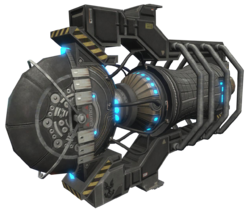Slipspace drive: Difference between revisions
From Halopedia, the Halo wiki
| Line 21: | Line 21: | ||
==Forerunner== | ==Forerunner== | ||
==Forerunner== | |||
[[File:Forerunner Slipspace Drive.jpg|thumb|left|150px|A Forerunner Crystal resonance chamber.]] | |||
Forerunner understanding of the mechanics of slipspace far exceeded that of the UNSC or the Covenant. They used [[Slipspace flake|small crystals]] embedded in their slipspace drives to manipulate slipspace,<ref>'''[[Halo: Cryptum]]''', ''page 124''</ref> allowing smoother transitions.<ref>'''Halo: Silentium''', ''pages 104-105''</ref> They had a superior grasp of [[reconciliation]], the ability to correct or otherwise manipulate the causal effects of slipspace travel.<ref>'''Halo: Primordium''', ''page 240''</ref> This was useful when carrying out large-scale coordinated military campaigns or simply moving across enormous distances. | |||
Forerunner ships are also extremely fast, as seen when the ''[[Mantle's Approach]]'' was able to travel from the vicinity [[Installation 03]] to [[Earth]] in a matter of minutes. Forerunner ships rely on their energy shields to keep them safe during the journey unlike UNSC ships which rely on just their armor.<ref>'''[[Halo 4]]''', level ''[[Midnight]]''</ref> | |||
==Trivia== | ==Trivia== | ||
Revision as of 14:06, February 13, 2018
- "They have opened a path to the stars for all of us."
- — Dedication to Tobias Fleming Shaw, ScD, QeD, FRS (January 30, 2220–November 10, 2317), and Wallace Fujikawa ScD, QEnD (April 20, 2215–February 18, 2318)[1]
The slipspace drive is a spacecraft propulsion system capable of making transitions to and from slipstream space and by extension allowing faster-than-light interstellar travel. The device functions by creating ruptures between normal space and slipspace. The nonstandard physics of slipspace allow it to be used as a shortcut realm, facilitating interstellar travel between distant regions in reasonable time.[2]
Human
Humans created the Shaw-Fujikawa Translight Engine.
 This section needs expansion. You can help Halopedia by expanding it.
This section needs expansion. You can help Halopedia by expanding it.
Covenant
Being more technologically advanced than humanity, the Covenant have numerous advantages in slipspace propulsion systems. Whilst the human Shaw-Fujikawa engine is said to “punch” a hole between realms using brute force, Covenant engines instead take a small rupture and delicately enlarge it with surgical precision. This allows the latter to execute far more accurate slips.[3] Covenant slipspace drives are often referred to as "jump drives".[4] In addition to their more powerful thruster engines, it has been theorized by the UNSC that Covenant drives generate several "microjumps" within a single slipspace transition to measure the dilation involved in a jump, allowing them to reach their destinations faster.[5]
Covenant drives are generally more flexible and powerful than those of humans. They have thrice been seen to execute in-atmosphere slipspace transitions[6][7] (although the first time the drive in question was controlled by a human AI). In addition, Covenant drives can execute successful slips even if underpowered.
Known Borers
- Ophon-pattern - Used on the Ket-pattern CCS-class battlecruiser.
- Primus-pattern - Used on the Kerel-pattern CAS-class assault carrier.
- Tyros-pattern - Used on the SDV-class heavy corvette.
Forerunner
Forerunner
Forerunner understanding of the mechanics of slipspace far exceeded that of the UNSC or the Covenant. They used small crystals embedded in their slipspace drives to manipulate slipspace,[8] allowing smoother transitions.[9] They had a superior grasp of reconciliation, the ability to correct or otherwise manipulate the causal effects of slipspace travel.[10] This was useful when carrying out large-scale coordinated military campaigns or simply moving across enormous distances.
Forerunner ships are also extremely fast, as seen when the Mantle's Approach was able to travel from the vicinity Installation 03 to Earth in a matter of minutes. Forerunner ships rely on their energy shields to keep them safe during the journey unlike UNSC ships which rely on just their armor.[11]
Trivia
- In real-world physics, black holes have been identified as a possible vector for constructing traversable wormholes, specifically through the use of the Kerr metric.
List of appearances
|
|
Sources
- ^ Halo 3, multiplayer level Orbital
- ^ Halo: The Fall of Reach, page 141
- ^ Halo: First Strike, page 86
- ^ Halo: Contact Harvest, page 136
- ^ Halo: First Strike (2010), Tug o' War
- ^ Halo: First Strike
- ^ Halo 2, level Delta Halo
- ^ Halo: Cryptum, page 124
- ^ Halo: Silentium, pages 104-105
- ^ Halo: Primordium, page 240
- ^ Halo 4, level Midnight


